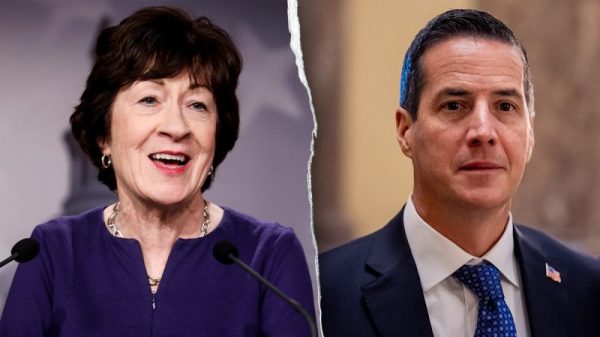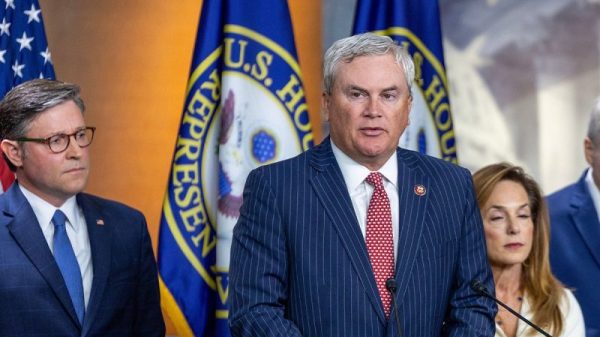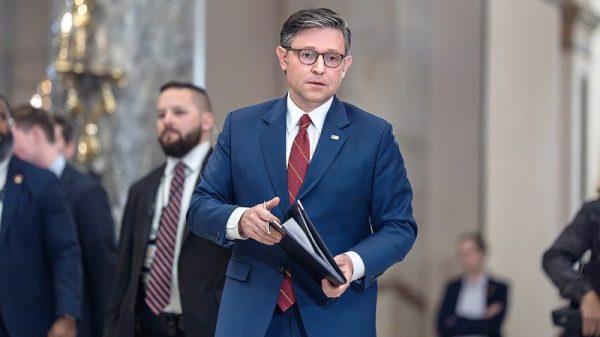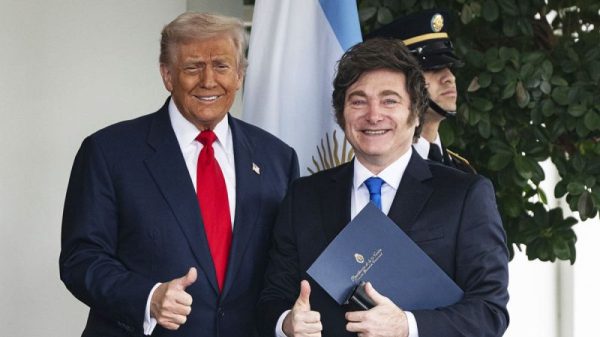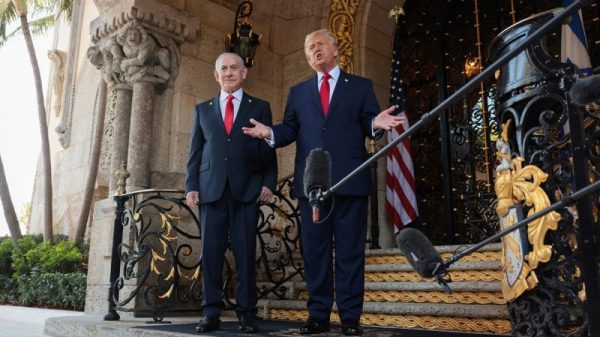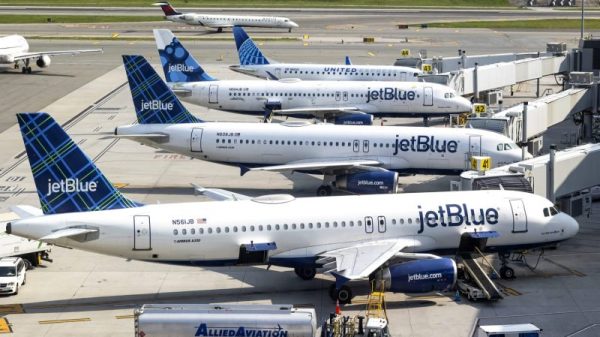A federal courthouse near the foot of the U.S. Capitol will be ringed with law enforcement Thursday, prepared to welcome Donald Trump back to a neighborhood where he rallied thousands of angry supporters toward the seat of government less than three years ago. But this time, he’ll come not as the president, but as a criminal defendant.
As Trump’s team finalizes his travel from Bedminster, N.J., to Washington — where he will face charges that he conspired to subvert the results of the 2020 presidential election — federal and local law enforcement officials in the District have been coordinating security measures for his arrival.
The Federal Protective Service parked vehicles in a lot along Constitution Avenue. The U.S. Marshals Service has stepped up protection for judges assigned to the case, and metal bike rack barriers were placed near the court’s entrance to control pedestrian traffic.
But unlike in Miami and New York, two cities where the former president has recently appeared to face federal charges and local officials publicly urged calm, officials here have stayed largely quiet on logistical and security planning. Mayor Muriel E. Bowser (D) declined to comment on what she expects Thursday, and both D.C. police and the U.S. Secret Service released only general statements promising safety and security.
At a news conference Wednesday afternoon, which Capitol Police called to address false reports of an active shooter inside the Capitol building, Chief Tom Manger said he had been talking to other agency heads about a possible indictment for “about a week” and had “a couple of calls today.”
“We’re prepared for tomorrow,” Manger said, though he declined to elaborate on what that preparation involves.
Washington is battle-tested when it comes to preparing for protests and appearances of high-profile officials. Since the Jan. 6, 2021, riot at the Capitol, law enforcement officials have repeatedly installed and removed fencing around the Capitol, positioned cement barriers at intersections across the city, and deployed teams of officers on foot, bike and even on horse to patrol the streets of the nation’s capital. At times, police have far outnumbered protesters.
Preparation for Trump’s Thursday appearance seemed, as of Wednesday afternoon, to be a scaled-back version of the full-fledged security apparatus D.C. has deployed for other events, such as President Biden’s inauguration. Manger said residents should not expect fencing near or around the Capitol. At the federal courthouse, journalists far outnumbered the two police cars parked outside.
Trump is scheduled to appear in the same courthouse where more than 1,000 people arrested and accused of federal crimes at the Capitol on Jan. 6 have been presented, entered pleas or gone to trial. As of July 6, about 700 have been found guilty and more than 560 sentenced to terms of up to 18 years in prison
In part because of their prosecutions, experts say, many right-wing organizers have decided that coming to D.C. is too risky. Some in far-right chatrooms have expressed fear that any event in D.C. is a “trap” set up by federal officials to arrest them, relying on a long-standing accusation that the Capitol riot was an “inside job.”
“Folks who showed up on Trump’s command in the past and sparked an insurrection, there have been consequences,” said Melissa Ryan, author of the Ctrl Alt-Right Delete newsletter that tracks online extremism. “There’s a cost for that now. And for groups like the Oath Keepers and the Proud Boys, this has been a huge hit to their infrastructure. Their leadership were convicted of high crimes.”
Since the Tuesday afternoon indictment, some online users called for a “civil war” and the need for an “armed revolution,” according to SITE Intelligence Group, which tracks online extremism. Others directed their anger toward grand jury members, special counsel Jack Smith and U.S. District Judge Tanya S. Chutkan, who will oversee Trump’s case. One user openly asked for Chutkan’s personal address, according to SITE.
On the pro-Trump “The Donald” forum, a user posted screenshots of the former president’s messages on Truth Social decrying the “Fake indictment.” Comments poured in, characterizing America as a nation falling apart under an “illegitimate government.” Then, as a recent SITE report notes, one commenter wrote: “And yet no one is willing to fight back.”
Save for the media tents and the false reports of an active shooter at the Capitol, there was little evidence in D.C. of the former president’s impending appearance. A farmers market was bustling midday Wednesday near the Ronald Reagan building, with vendors selling kettle corn and fresh-pressed orange juice. Tourists who just finished a tour of the Capitol said no one mentioned the indictment. And one artist selling photographs from D.C. protests had not heard that Trump was arriving this week.
Michael Thornhill, a 57-year-old historian visiting D.C. from Oxford, England, snapped a picture of his teenage sons smiling in front of the U.S. District Court, scores of journalists taking a lunch break behind him.
“It’s kind of bemusing, looking at America at the moment,” Thornhill said. “You only have to walk around this area to see how wrong Trump is.” He gestured to the Capitol and toward the nearby Justice Department. “It’s the separation of power.”
Thornhill said his family had just visited the National Archives, where they laid eyes on the Constitution, and were heading to the Capitol. The courthouse seemed an appropriate place to stop along the way.
A federal courthouse near the foot of the U.S. Capitol will be ringed with law enforcement Thursday, prepared to welcome Donald Trump back to a neighborhood where he rallied thousands of angry supporters toward the seat of government less than three years ago. But this time, he’ll come not as the president, but as a criminal defendant.
As Trump’s team finalizes his travel from Bedminster, N.J., to Washington — where he will face charges that he conspired to subvert the results of the 2020 presidential election — federal and local law enforcement officials in the District have been coordinating security measures for his arrival.
The Federal Protective Service parked vehicles in a lot along Constitution Avenue. The U.S. Marshals Service has stepped up protection for judges assigned to the case, and metal bike rack barriers were placed near the court’s entrance to control pedestrian traffic.
But unlike in Miami and New York, two cities where the former president has recently appeared to face federal charges and local officials publicly urged calm, officials here have stayed largely quiet on logistical and security planning. Mayor Muriel E. Bowser (D) declined to comment on what she expects Thursday, and both D.C. police and the U.S. Secret Service released only general statements promising safety and security.
At a news conference Wednesday afternoon, which Capitol Police called to address false reports of an active shooter inside the Capitol building, Chief Tom Manger said he had been talking to other agency heads about a possible indictment for “about a week” and had “a couple of calls today.”
“We’re prepared for tomorrow,” Manger said, though he declined to elaborate on what that preparation involves.
Washington is battle-tested when it comes to preparing for protests and appearances of high-profile officials. Since the Jan. 6, 2021, riot at the Capitol, law enforcement officials have repeatedly installed and removed fencing around the Capitol, positioned cement barriers at intersections across the city, and deployed teams of officers on foot, bike and even on horse to patrol the streets of the nation’s capital. At times, police have far outnumbered protesters.
Preparation for Trump’s Thursday appearance seemed, as of Wednesday afternoon, to be a scaled-back version of the full-fledged security apparatus D.C. has deployed for other events, such as President Biden’s inauguration. Manger said residents should not expect fencing near or around the Capitol. At the federal courthouse, journalists far outnumbered the two police cars parked outside.
Trump is scheduled to appear in the same courthouse where more than 1,000 people arrested and accused of federal crimes at the Capitol on Jan. 6 have been presented, entered pleas or gone to trial. As of July 6, about 700 have been found guilty and more than 560 sentenced to terms of up to 18 years in prison
In part because of their prosecutions, experts say, many right-wing organizers have decided that coming to D.C. is too risky. Some in far-right chatrooms have expressed fear that any event in D.C. is a “trap” set up by federal officials to arrest them, relying on a long-standing accusation that the Capitol riot was an “inside job.”
“Folks who showed up on Trump’s command in the past and sparked an insurrection, there have been consequences,” said Melissa Ryan, author of the Ctrl Alt-Right Delete newsletter that tracks online extremism. “There’s a cost for that now. And for groups like the Oath Keepers and the Proud Boys, this has been a huge hit to their infrastructure. Their leadership were convicted of high crimes.”
Since the Tuesday afternoon indictment, some online users called for a “civil war” and the need for an “armed revolution,” according to SITE Intelligence Group, which tracks online extremism. Others directed their anger toward grand jury members, special counsel Jack Smith and U.S. District Judge Tanya S. Chutkan, who will oversee Trump’s case. One user openly asked for Chutkan’s personal address, according to SITE.
On the pro-Trump “The Donald” forum, a user posted screenshots of the former president’s messages on Truth Social decrying the “Fake indictment.” Comments poured in, characterizing America as a nation falling apart under an “illegitimate government.” Then, as a recent SITE report notes, one commenter wrote: “And yet no one is willing to fight back.”
Save for the media tents and the false reports of an active shooter at the Capitol, there was little evidence in D.C. of the former president’s impending appearance. A farmers market was bustling midday Wednesday near the Ronald Reagan building, with vendors selling kettle corn and fresh-pressed orange juice. Tourists who just finished a tour of the Capitol said no one mentioned the indictment. And one artist selling photographs from D.C. protests had not heard that Trump was arriving this week.
Michael Thornhill, a 57-year-old historian visiting D.C. from Oxford, England, snapped a picture of his teenage sons smiling in front of the U.S. District Court, scores of journalists taking a lunch break behind him.
“It’s kind of bemusing, looking at America at the moment,” Thornhill said. “You only have to walk around this area to see how wrong Trump is.” He gestured to the Capitol and toward the nearby Justice Department. “It’s the separation of power.”
Thornhill said his family had just visited the National Archives, where they laid eyes on the Constitution, and were heading to the Capitol. The courthouse seemed an appropriate place to stop along the way.

